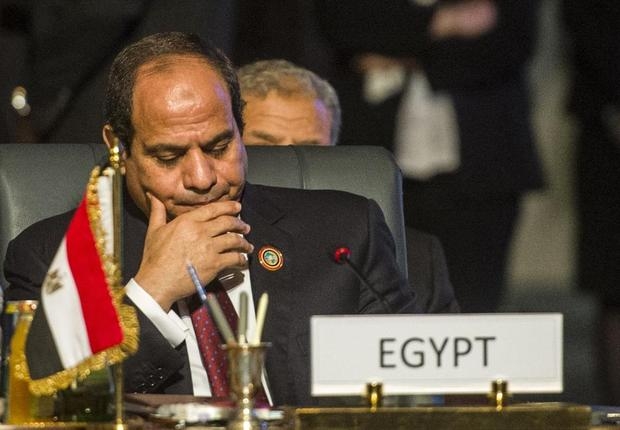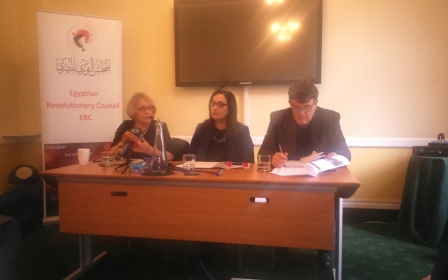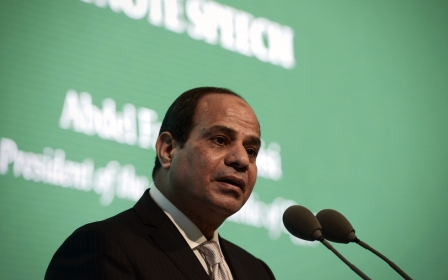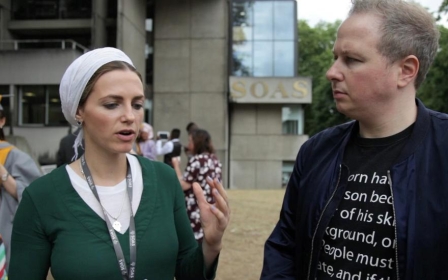Sisi's UK visit exposes lie about 'British values'

The imminent arrival of Abdel Fattah al-Sisi, Egypt’s president, on an official visit to the UK has been shrouded in secrecy. Even the exact date was until recently undisclosed, in no small part in an attempt to limit a tide of opposition to the arrival of a man with a track record on human rights that the NGO Human Rights Watch has described as involving “probable crimes against humanity”.
From a lack of accountability for the killing of protesters by security forces to mass detentions, military trials of civilians, hundreds of death sentences and the forced eviction of thousands of families in the Sinai Peninsula, the list of abuses has come to exemplify the repressive rule of a man who has succeeded in making his dictatorial predecessor appear like a political moderate.
Despite the British government’s seeming blind spot, the crackdown on everyone from political activists to the media, NGOs and now essentially the entire fabric of civil society, as well as the passing of intrusive surveillance legislation has been widely catalogued.
In May this year, Mohamed Zaree, programme director at the Cairo Institute for Human Rights Studies, was quoted as saying: “There are very clear attempts by the government to eliminate human rights work in Egypt at a time of some of the worst human rights violations.” Meanwhile, a report last month by the International Federation for Human Rights (FIDH) found that rape and sexual violence perpetrated by Egyptian security forces had surged under Sisi's watch, in a campaign to "eliminate public protest".
So why would the British prime minister, a man who recently defined British values as support for democracy and human rights – invite the leader of a widely condemned military dictatorship to 10 Downing Street? And isn’t this a contradiction between those British values and actual British actions?
British interests, not values
The short answer is no. It isn’t because there is no such thing as British values; there is only a discourse about Britishness and what it means, which is used to wield power over different groups both within British society and against other nations to serve British interests.
Much has been written about the alleged dissonance between the British government’s line on human rights and its actions in inviting the former head of Egypt's armed forces who has retained a penchant for his uniform, a man Amnesty international has described as facilitating “gross human rights violations”. The line goes that Britain prides itself on its promotion of and support for human rights and therefore such a move is out of state character, as it were.
The reality is that this frame reinforces the notion that such visits are merely the anomaly in an otherwise impeccable commitment to human rights and, although undeniably a dent in Britain’s image, don’t fundamentally undermine the broader notion of Britain as a country committed to the promotion of human rights.
The truth is that British people have fought long and hard to establish means of accountability, transparency and the rule of law that curb, to some extent, the repressive tendencies of governments. These aren’t so much British values as they are the privilege of nations whose history of military might and imperial conquest has afforded them the financial means and connected political stability to elaborate such structures, largely unimpeded by external meddling.
But the measure of a government’s commitment to such ideals is surely assessed less in a context where it is bound by historically grounded structures of accountability and more so by its actions in the shadows – and specifically whether it upholds those principles when critical voices are not present to witness their absence. If former Guantanamo detainee Shaker Aamer’s allegations are anything to go by, namely the claim that British officials were complicit in torture as part of the CIA's programme of torture and rendition, when it comes to human rights, governments, including the British government, regularly favour political expediency over commitment to lofty ideals.
Moreover, the discourse of human rights, with its claim to universalism, actually operates a useful function in legitimising the actions of governments even when they are behaving in ways that fundamentally contradict those proclaimed principles.
The British government can retain its commitment to human rights and reaffirm its international stature, just as it engages in illegal invasions which result in the deaths of hundreds of thousands of people. It can proclaim its “historic” commitment to democracy, just as it undermines democratic processes in Egypt or provides unaccountable aid to Bahrain, as the government there is involved in repressing popular movements.
Human rights only for some
In reality, there are still the "deserving" and the "undeserving" of human rights and because this is true, the very notion of any government’s universal commitment to such values should be read less as a moralising discourse and more a discourse of power - the power to assert a moral supremacy to buttress political ambitions. The power to claim Britain is a “moral nation,” just as the government does all it can to deny asylum to those fleeing war, violence and poverty, and supports a "let them drown" strategy to deter refugees and migrants. Those who can be stripped of their citizenship or judged on the basis of secret evidence. Those who can be detained indefinitely or summarily executed without trial.
The human rights discourse serves as a moralising shield against accusations that the British government is involved in the sorts of activities it actively denounces in other countries and even uses as cover for imperial motives. Other people’s human rights violations – those of Saddam Hussein by the 2000s (not before!), Muammar Gaddafi, or the Taliban - are all justifiable grounds for military interventions, but not so those of Saudi Arabia, nor China, whose president was recently welcomed with not a mention of Xi’s overseeing of the most severe crackdown on civil society since the Tiananmen Square massacre 26 years ago.
When it comes to foreign policy at least, realpolitik - not “British values” - remains the order of the day. Sisi isn’t here to be lectured on popular uprisings for free and accountable government, he’s here in Britain as an important customer, the British government having just licensed £85m worth of arms exports to his regime, while last month, 40 companies accompanied an FCO minister on the largest trade mission to Egypt in more than a decade.
And because this is the case, it isn’t enough to denounce Sisi’s visit as somehow at odds with “British values”. It’s at odds with basic humanity to offer a state-sanctioned welcome to a political tyrant and add insult to injury by granting “special mission immunity” to block any opportunities for the arrest of the Egyptian president’s army chief of staff, Mahmoud Hegazy, accused of crimes against humanity.
Business first
Instead, we should examine the ways in which the government instrumentalises the discourse on human rights to further narrow and often short-term business interests, which ultimately undermine the very values its proclaims and in fact, furthers the conditions for the development of the kind of social problems, from poverty to terrorism, which it claims to denounce.
The problem with framing Sisi’s welcome by the prime minister as a departure from British standards is primarily that it isn’t actually one. Rather, it reflects on longstanding commitment to the pursuit of British interests in the Middle East over and above all other considerations - human rights, popular revolutions or violent repression included. It is the same reason former president Hosni Mubarak was described by Margaret Thatcher as “among our very favourite visitors” to the UK, during a dinner at 10 Downing Street in the 1990s, just as he was overseeing a repressive crackdown on political expression and human rights violations. Or why Prince Charles enjoys a "special relationship" with consecutive Saudi monarchs, most perfectly illustrated by the lowering of flags to half-mast on government buildings and royal palaces to mark the death of King Abdullah back in January, in the same year as Saudi executions reached levels unparalleled since 1995.
There is no commitment to human rights by the UK unless it suits British interests to raise them and they certainly are unlikely to trump business considerations. More nefarious still is the suggestion that the promotion of business interests in Egypt, which have grown by nearly a quarter to £1.6bn since last year, are part of a wider commitment to maintaining dialogue over human rights and promoting democracy. Tony Blair, an adviser to Sisi as part of a programme funded by the United Arab Emirates committed to delivering huge "business opportunities," is the promoter of an Orwellian newspeak discourse on Sisi, which presents the tyrant as a misunderstood vanguard for democracy. You couldn’t make it up.
In an illustration of just how massive economic projects flaunted as progress have had little effect on average Egyptians, an Egyptian graphic designer ridiculed a state-sanctioned hashtag used to celebrate the opening of the much touted "new" Suez Canal, by creating mock-up posters showing the high-levels of poverty, inequality and unemployment under Sisi. One particular poster pointed to Egypt’s 25.2-percent poverty rate, 13.4-percent unemployment rate, 26.1-percent illiteracy rate and 6.2 trillion Egyptian pounds ($772 billion) of debt, using the ironic hashtag #EgyptRejoices.
Sisi’s visit to the UK is a travesty to universally cherished values of freedom, accountability and fairness – but his visit also reveals the much more sinister face of the British government, which while paring itself with the mantle of hard-fought human rights to legitimise its actions, undermines those principles wherever global citizens don’t have the power to hold it to account.
- Myriam Francois-Cerrah is a Franco-British journalist, broadcaster and writer with a focus on current affairs, France and the Middle East.
The views expressed in this article belong to the author and do not necessarily reflect the editorial policy of Middle East Eye.
Photo: File photo of Egypt's President Abdel Fattah al-Sisi (AFP).
New MEE newsletter: Jerusalem Dispatch
Sign up to get the latest insights and analysis on Israel-Palestine, alongside Turkey Unpacked and other MEE newsletters
Middle East Eye delivers independent and unrivalled coverage and analysis of the Middle East, North Africa and beyond. To learn more about republishing this content and the associated fees, please fill out this form. More about MEE can be found here.





